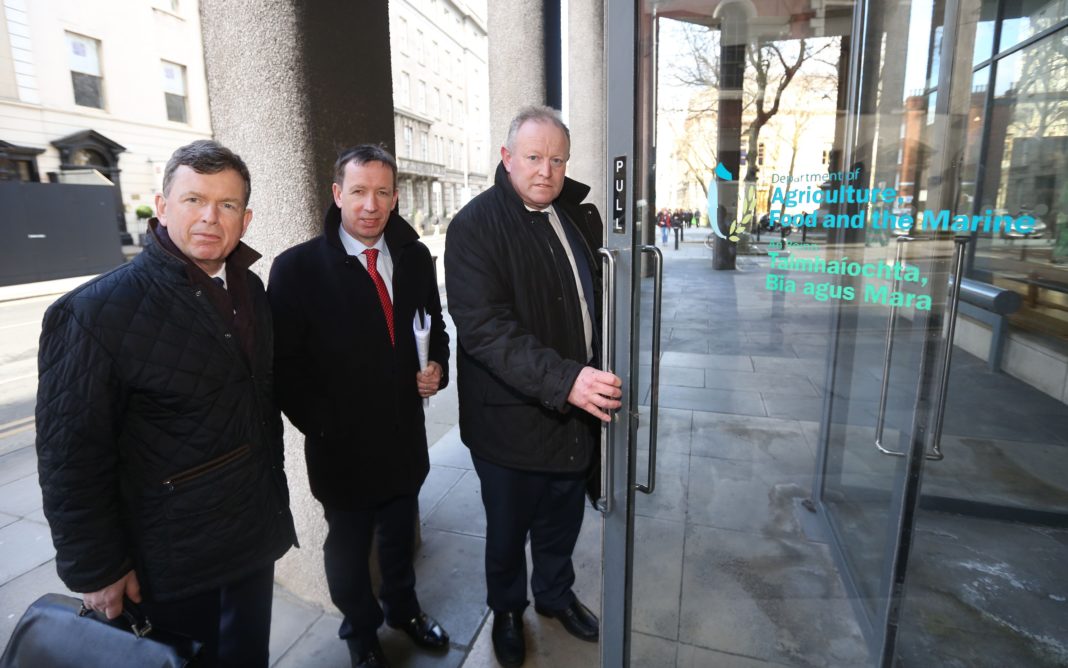IFA National Chairman Jer Bergin said the IFA Submission to the Dairy Forum focuses on measures that would make a rapid impact on farmers’ cash flow, be they measures that can be implemented nationally by all the stakeholders including government working in unison, on EU measures, which the Minister must secure at the next Agriculture Council Meeting.
He said, it is also important that the Dairy Forum meets more regularly to co-ordinate the development of a sustainable model for the sector, in the context of volatile dairy markets, but also in the context of geopolitical, currency and climatic instability, to ensure the price risk is shared more fairly.

“We welcome the fact that Minister for Agriculture Simon Coveney accepted our view that the Dairy Forum needed to be recalled, in light of the prolonged dairy downturn and the need to co-ordinate strategic support actions, in particular to deal with on-farm cash flow pressures this year,” Jer Bergin said.
IFA National Dairy Chairman Sean O’Leary added: “In our submission to the Dairy Forum, we have looked for all the Irish stakeholders to play their fullest part in providing farmers with support and assistance, including co-ops, Teagasc and other agencies, banks and of course the government,” he said.
“Minister Coveney must make sure that he steers and encourages all stakeholders to co-ordinate their actions, and to deliver milk price supports, including through fixed price contracts, flexible merchant credit, advice on sustainable cost cutting, and flexible, competitively priced short term and investment finance which allows farmers to vary their repayments to reflect income levels without the additional cost of renegotiation.
“At EU level, Minister Coveney must obtain a suspension of superlevy payments for 2016 – a suspension of at least 1 year for repayments to give farmers real cash flow relief. In addition, he must also demand the suspension of import tariffs on fertiliser, to create greater competition on EU markets, and reduce farmers’ costs meaningfully.
“Intervention buy-in must exceptionally this year continue at full price even when maximum levels have been reached, and a comprehensive review of the intervention scheme must be announced and started. APS must be also extended, and the enhanced SMP scheme made more flexible by removing penalties for early withdrawal.
“The maximum limit to state aids – the de minimis clause – currently set at €15,000 over 3 years per farmer, must be doubled to €30,000 to facilitate national farmer support initiatives, including the type of tax proposals put forward by IFA to deal with volatile incomes.
“Just as important as what measures we need from Europe are the measures that should be resisted. Talk of EU wide production management based on incentives or penalties are retrograde, ineffectual, and must be rejected. Not only can they not impact dairy prices determined on the global scene, they would be deeply unfair to progressive EU farmers who have invested to grow their business in response to growing global demand in the legal certainty that quotas were at an end.”
Finally, Sean O’Leary said the Forum needs to have a longer term discussion on what will be a sustainable model for the industry in the context of not only volatile dairy and milk prices, but a volatile business environment from the point of view of geopolitics, climate and general economic factors.
“Currently, farmers take 100% of the market price risk. We are fortunate that we own our industry through the co-op structure and that some price support has been provided over recent months. However, co-ops budget each year for all their costs, and the last “cost” is milk, and it takes what is left, leaving the farmer to carry the quasi totality of the risk,” he said.
“Farmers are being asked to commit supplies for a few years through a Milk Supply Agreement, and many are asked to forecast their output for the next 3 years. Yet, there is no quid pro quo commitment on a price that would cover production costs for at least a portion of the volume committed. I believe co-ops can and must change this situation including through greater use of the fixed price contracts and other forms of hedging – but they need to challenge the status quo, as the long term sustainability of the Irish dairy sector critically depends on farmers being able to make a viable income from milk production, year in, year out,” he concluded.








